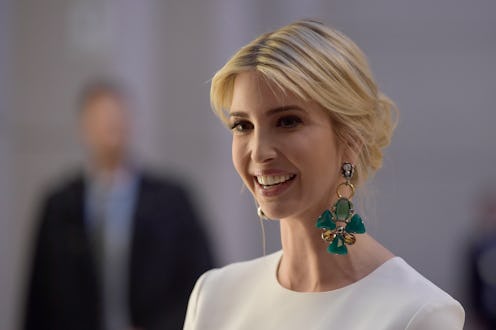
The president's stance on allowing refugees into the United States has been controversial, to say the least. From a campaign promise involving a "total and complete shutdown of the entry of Muslims" into America to a revised travel ban targeting six Muslim-majority countries, Trump's position on who should be allowed to enter the country has caused nationwide turmoil and international chaos. Which is why statements from Ivanka Trump contradicting her father on entry for refugees have surprised some people.
Unlike her father, Trump showed a seemingly more open attitude toward the possibility of allowing refugees into the United States. In an interview on NBC's Today, Trump said that the plight of Syrian refugees was a "global humanitarian crisis" which necessitated a united front from all members of the global society in order to solve it.
When asked whether the United States should consider opening its borders to refugees, the first daughter responded, "That has to be part of the discussion, but that's not going to be enough in it of itself."
Trump's statements arrive at a particularly critical moment. Mere weeks ago, father authorized the launch of dozens of Tomahawk cruise missiles against a Syrian airfield. Interestingly enough, in an interview with The Telegraph, her brother Eric Trump revealed that he was "sure" that his sister had some part in influencing their father to attack Syria. Trump clarified this point to reporters in Berlin. She said that while her take on the attack mirrored her father's position, her brother had a "flawed interpretation" of how the final decision was taken.
This is not the first time Trump has been asked about her father's position on refugees, as well as for her own take. Right after tweeting that she was "proud" of her father for making a "difficult" decision, CNN's Jake Tapper asked Trump if she felt there was an inconsistency in her father's supposed concern for the Syrian civilians suffering under Bashar Al-Assad's regime and "the proposed ban on Syrian refugees from entering the United States." Trump did not respond to Tapper's question.
While the president insisted from the get-go that the reason for his refugee ban was to protect national security, it is important to remember that the vetting process for refugees in America is already extremely detailed, lengthy, and intense.
It is understandable that Trump's statement may appear refreshing to those who have witnessed consistent hostility from the White House toward accepting and resettling refugees from war zones. But it is critical to remember that while her stance sounds slightly different from her father's, it is still unclear what "the discussion" will be about, and whether or not the administration will ultimately open America's borders to those fleeing brutal repression in their homelands. After all, statements alone do little to alleviate the predicament of refugees.